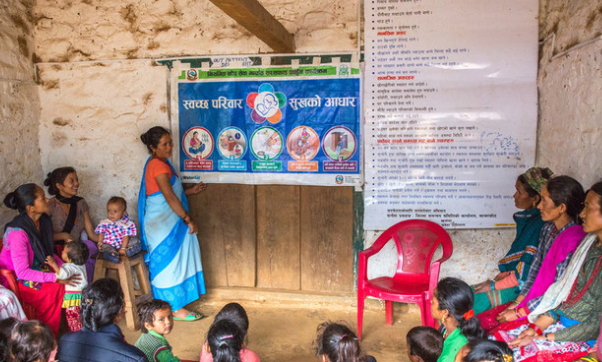Integrating child health and WaSH policies will increase the effectiveness of aid delivery

New research by WaterAid and PATH has found that combining clean water, decent household toilets and good hygiene with childhood vaccinations and nutrition support could prevent 697,000 child deaths each year and millions more cases of pneumonia and diarrhoea.
Each year almost 300,000 children die around the world from diarrhoeal illnesses and more than half of these are directly related to dirty water, poor sanitation and poor hygiene. Multiple cases of diarrhoea can cause stunting, effect long term development and hinder education.
Around the world 2.3 billion people do not have access to a decent toilet, equating to 1 in 3 people, and 844 million do not have clean water close to their home, equating to 1 in 9 people.
However, the report found that major health gains are both possible and achievable if investment and action in child health, water, sanitation and hygiene are coordinated.
Scaling up an integrated package of WaSH, vaccinations and nutritional interventions to 100% coverage could cause child morbidity to decline by up to 63% and halve fatal cases of diarrhoea and pneumonia. The report also suggests that delivering WaSH and healthcare services together can halve the probability of a child being stunted.
Similarly, combining the services of WaSH and health would create greater efficiency and cost effectiveness. Currently for every $1 invested in water and sanitation there is a $4.3 return in reduced healthcare costs.
The findings of the report also demonstrate the economic benefits of combining WaSH and health programmes. Stunting can cause economic losses of up to 9-10% of total GDP per capita, therefore an integrated approach could improve productivity and economic growth.
This integrated approach has been previously trialled by WaterAid in Nepal and proved very successful.
Margaret Batty, director of global policy and campaigns at WaterAid, said:
"If children are to grow and thrive, they need clean water, good sanitation and good hygiene alongside good healthcare, vaccinations and good nutrition. Each year, nearly 300,000 young children die of diarrhoea directly linked to dirty water, poor toilets and poor hygiene, and the greatest tragedy of all is that we know how to address this. This study adds to the evidence that the lives of hundreds of thousands of young children could be saved each year if these pillars of development were combined with other health interventions.”
"As the World Health Assembly in Geneva approaches, WaterAid is calling on world leaders to ensure that whenever they are investing in health and nutrition, they are also investing in water, sanitation and hygiene. They can save so many lives by combining these efforts."
Similarly, Eileen Quinn, Director of PATH's Defeat Diarrhoeal Disease Initiative, commented:
"Diarrhoeal disease is the second leading killer disease of children under five around the world, and even when children survive, they may be left with irreversible physical and cognitive effects. This study provides even stronger evidence that when we combine vaccinations and essential nutritional support with water, sanitation and hygiene, we can prevent illness, save children's lives and help them to grow and reach their potential. The reason to act is clear; leaders and policy-makers need to coordinate and integrate their efforts, and invest in our children's health and well-being."
In light of their report WaterAid are encouraging governments and donors to integrate their health and WaSH programmes to improve the efficiency of their aid delivery.
Join us for the 4th Annual AIDF Asia summit where WaSH and healthcare policies in Asia will be a key discussion point.
Join us for the 10th Anniversary AIDF Global Summit on 5-6 September in Washington, D.C, USA, where disaster resilience and recovery will be a key discussions.
If you’d like to stay informed on the latest updates in aid and development, please sign up for the AIDF newsletter.
Image credit: WaterAid















